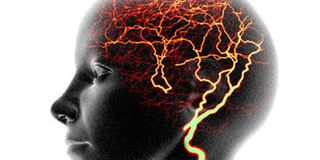Let’s create awareness about epilepsy and end stigma

Epilepsy occurs due to uncontrolled electrical discharges in the brain that result in convulsions, or changes in the mental state and uncontrolled body movements. FILE PHOTO | NATION MEDIA GROUP
What you need to know:
I have found that those without proper information about epilepsy are the most likely to exclude epileptic people through their nagging or misinterpretation of what the latter are capable of. This could trigger more seizures and slow recovery.
Purple Day is an international occasion, when people worldwide wear something purple to show their love and solidarity with millions of people living with epilepsy and their families and also create awareness about this diagnosis.
I had my first seizure at 17. I was in my last year of high school and looking forward to the so-called “independent life”.
The seizure happened in the classroom and I was rushed to hospital. I spent some time out of school as the doctors investigated what had caused the seizure and determine if I had epilepsy or if it was a sign of something else. I was eventually given an epilepsy diagnosis and asked to take a short break from school.
BEING POSSESSED
When I went back to school, most of my fellow students did not know how to interact with me. Most of them opted to avoid me lest they ‘contracted what I had’. Some whispered that I had a spirit in me and that made me have convulsions.
They would quote a Bible verse, from the Gospel According to Luke, which describes a boy with epilepsy-like symptoms — having convulsions and foaming in the mouth — as being possessed.
The story is actually recorded in another two of the four Gospels — Matthew and Mark — but it is only in Matthew’s account that the word “epileptic” is used.
Sadly, I encountered even more of these viewpoints after school from Christians who also quoted the Bible.
As if to drive their point home, some would reference the book of Matthew, which shows some of the places this boy would fall into — fire and water — both known to be places where most people living with epilepsy tend to have most accidents.
They would conclude with what they thought was a hopeful message for me — suggesting that, since prayers helped the boy, I, too, should say prayers so that this thing can be lifted from me. Others went as far as to question my faith in God by asking how much I prayed and if I ever fasted.
SPRITUAL ILLNESS
When I responded, they would comment on how weak my faith was if I was prayerful as I claimed to be and still got seizures.
The belief that epilepsy is a spiritual illness and that those who have it need to have more faith and seek deliverance to be healed, however, causes exclusion and anxiety and could even slow recovery for people living with epilepsy.
Being around people who made me question my faith led me to start avoiding going to church altogether. I wanted the church to be a place of refreshing and not where I would be reminded of what was wrong with me and how much more I needed to pray or fast.
I have found that those without proper information about epilepsy are the most likely to exclude epileptic people through their nagging or misinterpretation of what the latter are capable of. This could trigger more seizures and slow recovery.
The Church has an opportunity to correct this by providing safe spaces for those who have been hurt by the misinterpretation of Scripture and creating awareness to those who visit the places of worship.
Through dedicated awareness services and other activities, such as medical camps, the Church can begin and sustain continued support for people living with epilepsy and their families. The leaders of religious institutions need to get proper training about epilepsy and be ready to refer the sick to medical institutions and not just insist on prayer and fasting.
PURPLE DAY
Today is the perfect day for them to start. Purple Day is an international occasion, when people worldwide wear something purple to show their love and solidarity with millions of people living with epilepsy and their families and also create awareness about this diagnosis.
One of the things people like me, who are living with epilepsy, battle is stigma, which stems from ignorance and misinterpretation.
With Kenya identifying as over 80 per cent Christian, this would be a good time for places of worship in the country to mention and have conversations around this illness that more than a million citizens live with and one in every 50 do not have proper information about.
These conversations should, however, not occur in a vacuum. They should not be conversations for conversations' sake, but targeted conversations that lead to action. That action could range from inclusion in those places of worship, emergence of safe spaces and spaces of support for people living with epilepsy and their families and, to some extent, feed into national conversations on how to take care of and support people living with epilepsy.
Action does not have to wait though. Right now, churches and churchgoers can start by showing their love and solidarity with the millions of people across the globe by wearing purple on this Purple Day and getting the right information about epilepsy.
Ms Wafula, TED speaker and Aspen Institute New Voice fellow, is founding executive director of The Sitawa Wafula Mental Health Academy. [email protected]





